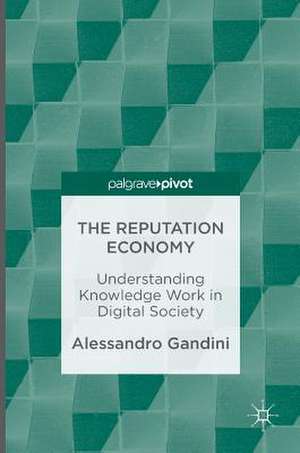The Reputation Economy: Understanding Knowledge Work in Digital Society
Autor Alessandro Gandinien Limba Engleză Hardback – 21 iun 2016
Preț: 450.71 lei
Nou
Puncte Express: 676
Preț estimativ în valută:
86.25€ • 93.66$ • 72.45£
86.25€ • 93.66$ • 72.45£
Carte tipărită la comandă
Livrare economică 22 aprilie-06 mai
Preluare comenzi: 021 569.72.76
Specificații
ISBN-13: 9781137561053
ISBN-10: 113756105X
Pagini: 151
Ilustrații: IX, 131 p. 5 illus.
Dimensiuni: 148 x 210 x 15 mm
Greutate: 0.33 kg
Ediția:1st ed. 2016
Editura: Palgrave Macmillan UK
Colecția Palgrave Macmillan
Locul publicării:London, United Kingdom
ISBN-10: 113756105X
Pagini: 151
Ilustrații: IX, 131 p. 5 illus.
Dimensiuni: 148 x 210 x 15 mm
Greutate: 0.33 kg
Ediția:1st ed. 2016
Editura: Palgrave Macmillan UK
Colecția Palgrave Macmillan
Locul publicării:London, United Kingdom
Cuprins
Introduction. Beyond the "creativeclass" vision.- 1- The rise of a freelance economy.- 2- Reputation, the social capital of a digital society.- 3- Urban digital work: the cases of London and Milan.- 4- Working online: an exploration of Social Recruiting and Digital Marketplaces.- 5- Understanding digital work as venture labour.- 6- Co-working: the freelance mode of organization?.- Conclusion. The aftermath of neo-liberalism and the future of the Left.- Bibliography.- Index.
Notă biografică
AlessandroGandini is a lecturer in the Media department of Middlesex University, London,UK, and is research active at the Centre for Digital Ethnography, University ofMilan, Italy.
Textul de pe ultima copertă
Exploringthe new professional scenes in digital and freelance knowledge, thisinnovative book provides an account of the subjects and cultures that pertainto knowledge work in the aftermath of the creative class frenzy. Including abroad spectrum of empirical projects, TheReputation Economy documents the rise of freelancing anddigital professions and argues about the central role held by reputation withinthis context, offering a comprehensive interpretation of the digitaltransformation of knowledge work. The book shows how digital technologies arenot simply intermediating productive and organizational processes, allowing newways for supply and demand to meet, but actually enable the diffusion ofcultural conceptions of work and value that promise to become the new standardof the industry.
















